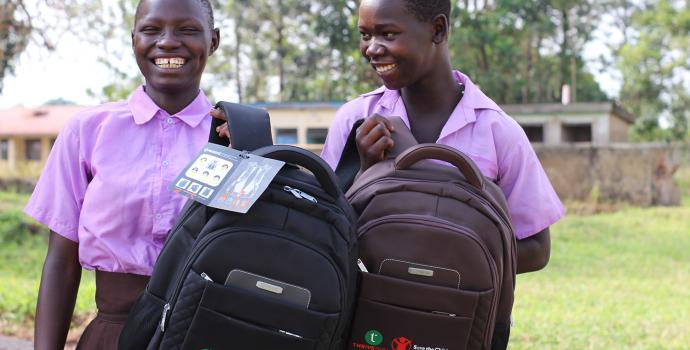Helping children recover from the nightmares of war
Above: Akello*, now 6 years old and in a refugee settlement in western Uganda
Save the Children is launching a global campaign to Stop the War on Children and help children like Akello*. Find out more about the campaign at www.stopwaronchildren.org/
Six-year-old Akello* doesn’t seem to remember what happened that terrible day, but she often wakes up screaming in the middle of the night.
Her mother, Mirembe*, will never forget it. Mirembe and her husband were in the field tending their crops, while Akello slept peacefully under a nearby tree. Suddenly armed men attacked from both sides of the village. Akello and her parents became separated in the chaos of the fighting, as people fled or were killed.
“They began shooting when our child was sleeping under the tree,” she recalls. “I saw people running. I went to get her but the rebels were coming from that direction.”
In the aftermath of the attack, Mirembe and other villagers counted the dead and wounded. Mirembe’s son was among those killed. When they found Akello – then aged just four – she had been raped by the militia. She was in terrible condition and spent the next two months on life support in hospital.
A few months later, the armed men returned to the village. “The rebels came at night and asked for money and when we gave them the little we had, they refused saying that it was very little. They got my husband, beat him and broke his back,” says Mirembe.
“Not only that, they made him carry a sack of rice and took him in the bush for a whole week. We thought that he was killed. Fortunately, after one week we saw him coming back naked.
“We changed our location but we were again attacked by the rebels.”
The militia left a note on their door saying they would return and kill them all if they didn’t pay up. In fear for their lives, the family packed up and fled to Uganda.
Now Akello lives with her parents in a refugee settlement in western Uganda. She suffers from nightmares, is stunted in her growth and solitary in her behaviour.
“(After the first attack) our daughter was taken to the hospital and she was improving and we were somehow happy, but when the last attack happened we had to leave before she completed her treatment,” says Mirembe. “As you can see, she is now six years but she isn’t growing. At that age she can’t recall what happened to her. The only thing I do observe from her is the trauma caused by the rape. She wants to be alone and in a solitary place. She was put on good diet but still there is no change in her growth.”
One of the few places Akello enjoys is Save the Children’s Child Friendly Space (CFS) - a safe place where children can play, learn, and interact with others. Save the Children runs more than 60 CFS across the refugee response in Uganda.
Our child protection team in the settlement also made sure she has access to specialist psychosocial support and counselling, and provided the family with items such as clothes, soap and mosquito nets. We hope that slowly she will begin to show signs of improvement.
But the situation is overwhelming and the humanitarian response is struggling to meet the needs. More than 1.25 million refugees have fled to Uganda – the third largest number in the world – and more still arrive daily. More than 60 percent of the refugees in Uganda are children, like Akello, fleeing terrible violence in some of the world’s worst conflict zones such as eastern DR Congo and South Sudan.
Funding for the crisis is not keeping pace with the needs. The 2019 response plan by UN and partners for supporting refugees from DR Congo is just 2% funded after five months of the year. Only $8.1 million of the $389.5m needed has come through so far.
Uganda has welcomed refugees in need of safety and aid, but needs support from the international community. As more refugee children continue to arrive in Uganda’s already overstretched settlements, children suffering the devastating effects of conflict desperately need help.
* Names have been changed to protect identities




